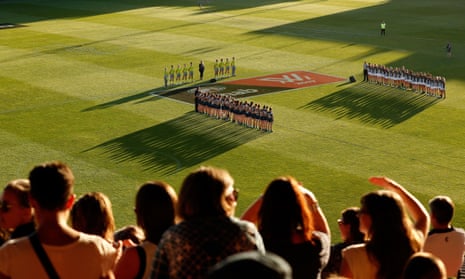The AFL’s last-minute decision to deny Hannah Mouncey the right to nominate for the 2018 AFLW draft is a significant step backwards in any self-professed claim the league has to inclusiveness. It amounts to a serious and damaging about-face for an organisation that so recently threw its support behind the marriage equality campaign in an effort to demonstrate its respect for all LGBTI people involved in the game, including its players.
The AFL has shown clear disrespect to Mouncey in the timing of the announcement. The AFL has been aware of her desire to be drafted since at least 23 June – when Melbourne inquired as to her availability – but waited until the last possible moment (late afternoon on the day before the draft) to make the announcement. There had been talks of an injunction to the draft if Mouncey was denied the right to be drafted, but the timing of the announcement means such a move is impossible. Compounding matters is the fact that – at this late stage – Mouncey has no possibility of appeal.
From the official press release, it was unclear why the adjudicating panel – comprising the AFL commissioner, Jason Ball, and Gabrielle Trainor, Simone Wilkie, Tanya Hosch and Andrew Dillon – had denied Mouncey the right to nominate. The statement said the decision “took into account the stage of maturity of the AFLW competition, its current player cohort and Mouncey’s individual circumstances”.
The AFL subsequently clarified it was concerned about the disparity in body size and bulk that Mouncey may have over the existing AFLW cohort after only a year of semi-professional training. It also confirmed she “may nominate for future AFLW drafts and for registration in other Australian football competitions”.
Such logic is hard to comprehend given that existing AFLW players have comparable builds to Mouncey. For example, at 190cm and 100kg, Mouncey is only one centimetre taller than GWS ruck Erin McKinnon. It is difficult to comprehend what would need to change about either Mouncey – or the AFLW cohort – for the AFL to reconsider its position in 2019 or beyond.
Then there is the question of whether Mouncey would be willing to go through this process again in 12 months’ time, given she would have to undergo further extensive testing and ongoing public scrutiny over her gender identity.
In making this call, the AFL appears to be in contravention of in own policies. Under AFL Victoria guidelines, “people who have been through the gender reassignment process shall be deemed the gender as verified by the appropriate Victorian state government documentation”. This follows International Olympic Committee guidelines – which the AFL has adopted – which allow transgender athletes to participate in their chosen sports without undergoing sex reassignment surgery.
Those same guidelines do outline that in order to determine eligibility for competition, a transwoman “must demonstrate that her total testosterone level in serum has been below 10 nmol/L for at least 12 months prior to her first competition”. According to reports, however, Mouncey’s latest reading was well below these guidelines, and could be as much as 20 times higher before approaching the recommended limit. In other words Mouncey clearly meets the AFL’s own guidelines – and these guidelines are not rules or regulations, but recommendations.
New AFL football boss Steve Hocking, however, on Tuesday appeared to contradict the league’s official position on the IOC criteria by arguing that those standards were not necessarily appropriate for the AFL. “The AFL game is quite different to a number of those sports,” he told AFL Trade Radio.
The AFL finished its media release by reiterating that it has “made very strong commitments to equality and inclusion at all levels of the game”.
“We recognise that participating in sport has physical, psychological and social benefits and we are committed to making Australian football on every level welcoming to all in our community,” the statement said.
In making this decision on Mouncey, however, the AFL has ruled that the wellbeing of trans footballers is an exception to the rule. In so doing, it cannot claim commitment to equality and inclusion for all.
